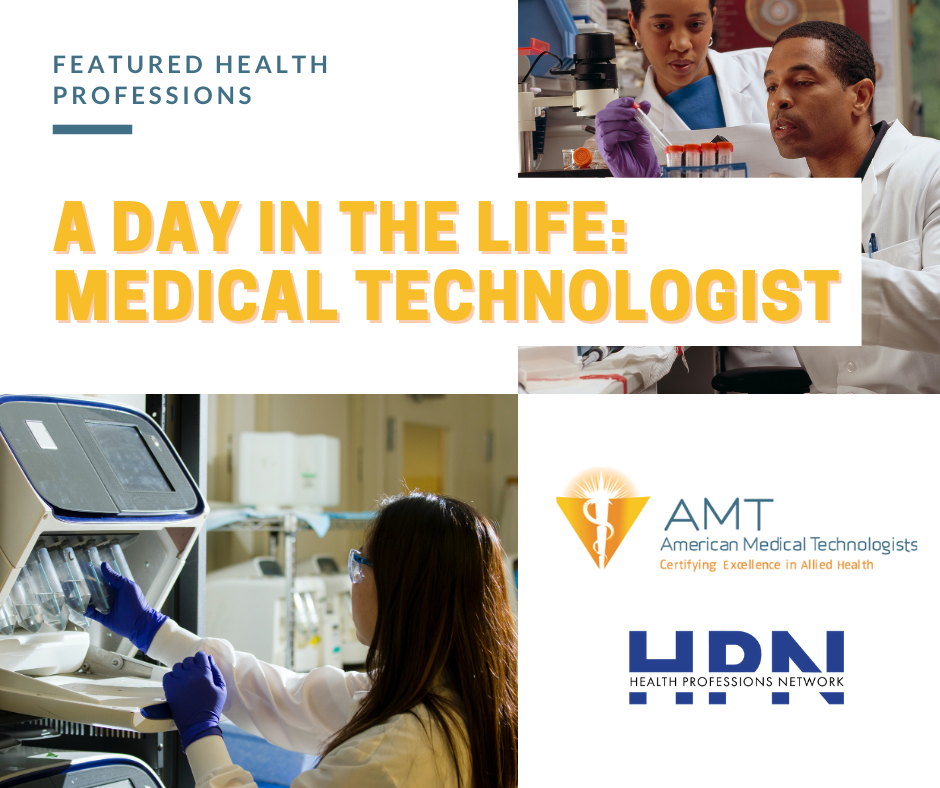This blog is the fifth in a series of profiles of different clinical health professions represented by Health Professions Network member organizations. These profiles are intended to give students and those looking at prospective careers in health care an accurate, professional perspective on different health care fields, specialties and careers. "A Day in the Life of a Medical Technologist" was developed in collaboration with American Medical Technologists (AMT), an HPN member organization.
Table of Contents
- What is a Medical Technologist?
- Rewards of Being a Medical Technologist
- Becoming a Medical Technologist
- Salary & Professional Outlook for Medical Technologists

What is a Medical Technologist?
Ever wonder who takes the time to examine your blood, tissue, or other samples after they’ve been sent to a lab for an annual checkup or diagnostic test? How about when you participate in your school, work, or community’s annual blood drive – who reviews your donation to determine your blood type and its compatibility with the blood types of those in need of transfusions? More often than not, medical technologists are the healthcare professionals sitting behind the microscope, standing at the centrifuge, or operating the cell counter to record and analyze the results of these and other tests. Their findings are critical to inform the treatment decisions made by your physician in consultation with your care team.
Ultimately, Medical Technologists (sometimes referred to as Clinical Laboratory Scientists) act as the intermediary between the outright science of healthcare, and the relationships and decisions that take place between patients and direct care practitioners. Though they are somewhat “behind the scenes” of patient care, the work of medical technologists is absolutely essential to ensure a high quality of care for patients and their families.
Job Description and Responsibilities of a Medical Technologist
The work of a medical technologist blends the worlds of scientific investigation, and evidence-based patient care. Tests performed by medical technologists are essential to direct patient treatment and detect diseases such as HIV/AIDS, a number of different cancers, diabetes, and other chronic illnesses. Prenatal blood tests might also be conducted by medical technologists to determine the health and potential risks for expectant mothers and/or their fetus during pregnancy. Complete blood counts, liver function tests, renal function tests, and phlebotomy are also performed by medical technologists.
The tests highlighted above are not a comprehensive list of all the various types examination medical technologists facilitate, but they illustrate the versatility of these professionals within the medical community. In short, when further examination is warranted, and tests are ordered on patient samples, more often than not a medical technologist is involved.
A few more of the duties and complex chemical, biological, hematological, immunologic, microscopic, and bacteriological analyses medical technologists perform include:
- Analyzing body fluids, such as blood, urine, and tissue samples, and record normal or abnormal findings
- Studying blood samples for use in transfusions by identifying the number of cells, the cell morphology or the blood group, blood type, and compatibility with other blood types
- Operating sophisticated laboratory equipment, such as microscopes and cell counters
- Using automated equipment and computerized instruments capable of performing a number of tests at the same time
- Logging data from medical tests and enter results into a patient’s medical record
- Discussing results and findings of laboratory tests and procedures with physicians
- Supervising or training medical laboratory technicians
As is apparent from the wide-ranging list of tasks medical technologists perform, their work provides for a diverse and stimulating professional experience. But the value of work as a medical technologist goes beyond the intellectual stimulation it provides.

Goals and Rewards of Being a Medical Technologist
According to the American Clinical Laboratory Association, lab tests guide “more than 70% of medical decisions,” further reinforcing the importance of medical technologists and the role they play in the delivery of high quality clinical care.
In addition to the central role medical technologists play for patient treatment through the analysis of laboratory tests, they also often find themselves in teaching positions across the healthcare spectrum. One example of this is the fact that medical technologists can attain certification and employment in infection control. In this capacity they are responsible for educating their medical colleagues about the risks associated with infectious diseases and how to minimize them.
Furthermore, medical technologists frequently contribute to clinical research to improve the science and practice of medicine, and their work leads to innumerable innovations and improvements across myriad specialties. Ultimately, medical technologists are an essential lynchpin to medical progress, in a broad sense, as well as patient safety and clinical care.

Becoming a Medical Technologist
Medical technologists are generally required to have a bachelor’s degree in medical technology or in one of the sciences (e.g., chemistry or biology). Bachelor’s degree programs in medical technology include courses in chemistry, biological sciences, microbiology, mathematics, and statistics, as well as courses designed to teach knowledge and skills used in the clinical laboratory. Medical technology programs are typically offered through a university with internships in a hospital setting.
Choosing an Accredited Program
Most medical technologist programs are accredited by the National Accrediting Agency for Clinical Laboratory Sciences (NAACLS).
Licensure: Some states require laboratory personnel to be licensed or registered. Licensure of medical technologists often requires a bachelor’s degree and the passing of an exam, but requirements vary by state and specialty. Information on licensure is available from state departments of health or boards of occupational licensing.
Certification: Many employers prefer applicants who are certified by a recognized professional association, such as the American Medical Technologists.
Advancement: Technicians can advance and become medical technologists through additional education and experience. Medical technologists may advance to supervisory positions in laboratory work or may become chief technologists or laboratory managers in hospitals. Manufacturers of home diagnostic testing kits and laboratory equipment and supplies also seek experienced medical technologists to work in product development, marketing, and sales. Professional certification, specialization and/or a graduate degree in medical technology, one of the biological sciences, chemistry, management, or education usually speeds advancement.
Employers seek laboratory personnel with good analytical judgment and the ability to work under pressure. Medical technologists in particular are expected to be good at problem solving. Close attention to detail is also essential for laboratory personnel because small differences or changes in test substances or numerical readouts can be crucial to a diagnosis. Manual dexterity and normal color vision are highly desirable, and with the widespread use of automated laboratory equipment, computer skills are important.
Salary & Professional Outlook for Medical Technologists
Medical technologists held about 164,800 jobs in 2014. Employment of medical laboratory technologists is expected to grow by 14 percent between 2014 and 2024, much faster than the average for all occupations. An increase in the aging population will lead to a greater need to diagnose medical conditions, such as cancer or type 2 diabetes, through laboratory procedures. Medical laboratory technologists will be needed to use and maintain the equipment needed for diagnosis and treatment.
The median annual wage of medical laboratory technologists was $61,070 in May 2016. The median wage is the wage at which half the workers in an occupation earned more than that amount and half earned less. The lowest 10 percent earned less than $41,550, and the highest 10 percent earned more than $85,160. In general, salaries are higher in a hospital setting than in physician offices.

